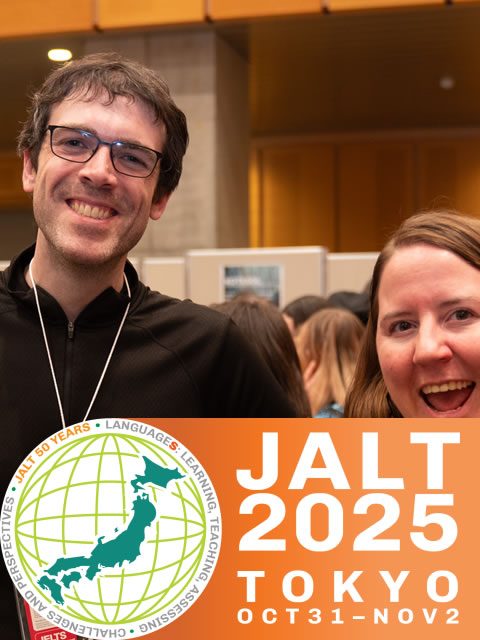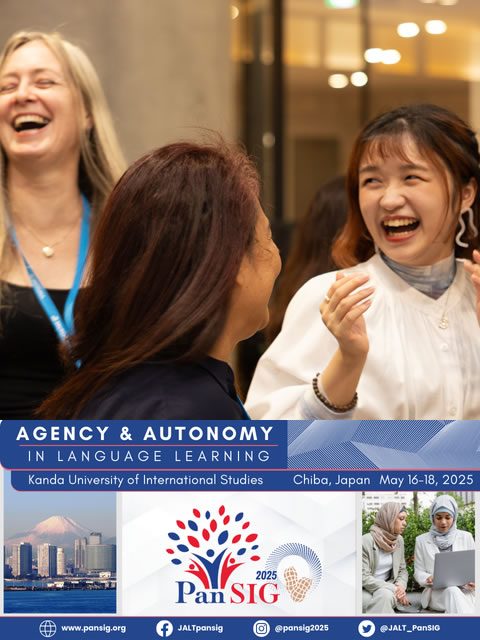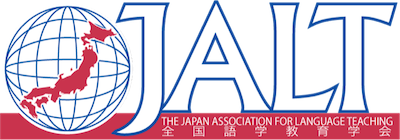Your cart is currently empty!
Technology in Teaching (TnT) Workshops
•
Digital technology for teaching and learning
As technology plays an increasingly important role in language education, teachers face the challenge of selecting appropriate technologies and learning how to use them. The aim of the JALT pre-conference Technology in Teaching (TnT) workshops is to help teachers navigate their way through the bewildering array of technologies available, select technologies which are appropriate for their teaching context, and learn how to effectively make use of the technology in the classroom. The TnT presenters, all experts in technology, will offer guidance on using technology and provide ideas on how to best integrate technology with language teaching practices. Participants are encouraged to bring along a Wi-Fi enabled device to participate fully in sessions.
TnT workshops are scheduled for Friday 20th November, 13:30 – 19:00. We recommend you pre-register online.
1st Session (13:30 – 15:00)
Thomas E. Bieri: “Building easy and free websites for teaching”
Eric Hagley: “Moodle for language teachers”
Adrian Leis: “Paperless tests to cut marking time up to 98%”
2nd Session
(15:30 – 17:00)
Steve Paton: “Using Keynote in the classroom on Mac and iOS”
Peter Ruthven-Stuart: “Using Moodle for teacher and student collaboration”
Samantha Kawakami: “Fast and easy videos with Adobe voice”
3rd Session (17:30 – 19:00)
Laurent Carlier: “How can tablets accelerate the ease of learning?”
Rab Paterson: “A Google approach to digital research and writing”
Marc Shrosbree: “Technology for a dynamic, communicative classroom” (45 minutes)
Mark Neufeld: “Using an iPad and Notability to assess writing” (45 minutes) Canceled
Paul Daniels: Designing web-based speaking apps with Google Speech(45 minutes)
Thomas E. Bieri
Building easy and free websites for teaching
Do you have a class website? Do you wish you could make one, but not feel confident in your tech skills? Then this is the workshop for you! Teacher and class websites can be a powerful tool for communication and course management. However, many teachers feel they do not have the expertise to create and maintain a website. This workshop will introduce two sites for building and hosting websites both easily and for free, and then guide participants in creating their own site during the session. Participants will practice simple methods for editing page layouts, adding images and videos, linking to other sites, etc. No experience is necessary, but bringing your own device and some ideas for content will help you get the most out of this session.
Thomas E. Bieri is currently an instructor at Nanzan University, and is an officer in both the JALT CALL and ER SIGs. He has over 25 years’ experience working in higher education, including positions in technical services and teaching. He holds a BA from the University of California, Berkeley, an MA in Applied Linguistics from the University of Southern Queensland, and a Graduate Certificate in Educational Technology from Michigan State University. His instructional and research interests include educational technology and extensive reading.
Eric Hagley
Moodle for language teachers
The Internet is a powerful tool however there is too much information in too many places for us to manage – we need something to manage it. Ideally that ‘something’ will allow us to create educational materials and enable students to interact with others in the class, the teacher, and students around the world. Could we include grading in this system so at the end of semester we can export grades to an Excel file? Since we are on a roll with the wish list, wouldn’t it be wonderful if this ‘something’ had a host of other learning tools and was free? That ‘something’ is Moodle. A learning management system used by thousands of universities and schools globally, Moodle lets teachers put learning materials in one place online so students can access and use them to practice what they are learning. Come and learn how to improve your classes with Moodle. * Please bring your own device and headphones.
Eric Hagley teaches at Muroran Institute of Technology in Hokkaido. He received his masters in applied linguistics from Macquarie University. He has been using computers and the WWW for international online language exchanges and collaboration since 2004. All his English classes have an online component. He is training director for the Moodle Association of Japan and has used Moodle extensively for the past 10 years. He has carried out workshops throughout Asia on using Moodle in language education and has developed many resources to enable teachers to use this powerful tool to improve their teaching and their students’ learning.
Adrian Leis
Paperless tests to cut marking time up to 98%
Many teachers, including myself, complain that they are overworked and underpaid. We find ourselves going beyond the typical nine to five work day, taking work home or staying late at the office attempting to catch up. Unfortunately, I cannot help you with being underpaid. I will, however, help you find more time: a lot more time. With the Google Docs add-on, Flubaroo, marking is done within seconds, regardless of class size. Because a report of test results is made immediately available, teachers can concentrate on places in which students were weak within minutes of their completing the test. This workshop begins with a test, through which participants experience Flubaroo from students’ perspective, after which we make a test together. If time allows, I will also share other add-ons useful for saving the most valuable commodity: time. * A computer with Internet access will be required for this workshop.
Adrian Leis is an associate professor in the English Education Department at Miyagi University of Education with more than 15 years’ experience teaching in Japan. His fields of research include L2 learning motivation and computer and mobile assisted language learning (CALL/MALL). He conducts paperless classes, flipped classrooms and exams and homework via computer and smartphone. Adrian has spoken at various conferences around the world and regularly leads workshops from 20 minutes to six hours on a range of topics, but especially related to motivation and CALL/MALL.
Stephen Paton
Using Keynote in the classroom on Mac and iOS
Using Keynote presentation software in lessons can help to make them more engaging for students, and more fun and efficient for teachers. For people who aren’t familiar with Keynote on the Mac and iPad, or have never really used presentation software before, this hands-on workshop will cover the basics; getting started with built-in templates, builds and animations using text and images, cool transitions, and some very special effects that you just can’t do on a blackboard! This is a hands-on workshop in which you’ll create a short presentation, so bring along your MacBook or iPad with the latest version of Keynote installed, and learn some easy, effective ideas that can be used in class right away.
Stephen Paton and Malcolm Swanson are members of the Apple Distinguished Educator program, which Apple describes as “a global community of education leaders recognised for doing amazing things with Apple technology in and out of the classroom.”
Stephen Paton (Fukuoka University) has been teaching English for 10 years, four of them in Australia, six in Japan.
Malcolm Swanson is currently teaching English and media skills at Seinan Jo Gakuin University in Kitakyushu.
Peter Ruthven-Stuart
Using Moodle for teacher and student collaboration
This workshop is for both novices and experienced Moodlers who would like to use Moodle to facilitate collaboration both between teachers, and between students. Moodle is advertised as being able to deliver “a powerful set of collaborative learning environments that empower both teaching and learning.” In this workshop you will be given hands-on access to a Moodle 2.9 system which showcases the features and activities that make it possible to create these collaborative environments. In the first half of the workshop, you will experience various features that permit teachers to both create content and to teach together. In the second half, you will discover how to get students to collaborate in small groups or whole class activities using standard features and modules. At the end of the workshop you will be able to export the demonstration courses to use in your own Moodle system. The Workshop web site is: http://vle.c.fun.ac.jp/workshop/.
Peter Ruthven-Stuart has been blending Moodle into his classes for the past twelve years. He also administrates six Moodle sites, and now manages four fully online courses for 500 students. His research interests include online collaborative learning. He is a founding member of the Moodle Association of Japan: http://moodlejapan.org.
Samantha Kawakami
Fast and easy videos with Adobe voice
Video is a great way to engage students. Getting familiar with the technology can often be a hurdle to creating and using video. Adobe Voice is a simple app that can be used to create simple videos. All you need is an iPad with Adobe Voice (free) and an Adobe account. This workshop will demonstrate how to use the various features of Adobe Voice. The workshop will also include tips on how to use it to create your own videos to help students improve their English, and how to get students to work on their own video projects.
Samantha Kawakami’s past experiences include teaching English for a large eikaiwa and working for Macmillan. Now Sam lives in Izumo, Shimane-ken, where she has her own school, teaches at Shimane University, and works for APRICOT Publishing. She loves trying new things and sharing ideas.
Laurent Carlier
How can tablets accelerate the ease of learning?
Are you interested in using iPads in your classes, but don’t know where and how to start? iPads have proven to be powerful creation and curation devices in the hands of students. Using a suite of apps, we’ll explore innovative ideas, effective techniques, and thoughtful plans for incorporating iPads into foreign language classrooms with an eye towards building creativity, collaboration skills, and critical thinking. This workshop is an excellent option for participants who are just getting started with iPads or who already possess a basic level of proficiency with iPads.
Laurent Carlier is an educational technology specialist, perpetual learner, and proponent of authentic, thoughtful use of technology in education. In the past 6 years, he has provided support and training on the iPad, IWB and innovative web based tools for educators and administrators and frequently run workshops and presentations on educational technology.
Rab Paterson
A Google approach to digital research and writing
This session will cover Google’s digital research tools like Google Scholar, Google Books, and Google Docs and a few non Google tools that interface with Google Apps like Zotero. Participants will learn how to use these tools for research in the digital age. Then the session will cover digital writing with Google Docs and a range of third party browser based apps that work with Google Apps to refine academic writing. Taken collectively this session will equip participants with a full digital age research and writing eco system that can easily be passed on to colleagues and students.
Rab Paterson is President of the Asia Association for Global Studies, and a Fellow of the British Royal Asiatic Society. In addition he is an Apple Distinguished Educator and Google Certified Teacher award winner, a Google Certified Educator, authorised Google Education Trainer and a Google Education Group Leader.
Mark Shrosbree
Technology for a dynamic, communicative classroom
In this workshop aimed particularly at “non-techie” teachers, I will start from the premise that technology should encourage interaction and genuine communication both inside and outside the classroom. With this in mind, I will explain technology which complements communicative approaches, and walk participants through the practical skills needed to apply this technology. I will address a broad range of topics, including the following: basic Word, Excel and PowerPoint skills; portable devices, such as smartphones and pico projectors; video methodologies; using Internet. Participants will receive practical guides to the technology introduced in the workshop, as well as internet links and ready-to-use teaching materials. It is hoped that everyone will leave the workshop with a range of ideas and skills ready to apply to their own classrooms.
Mark Shrosbree is an associate professor at Tokai University in Kanagawa, where he has been teaching for 15 years. He currently teaches ESP courses in Technical English and in Science Presentation, in which he employs technology that complements traditional classroom teaching approaches. His interests include course design, methodology and materials development, and he maintains an online materials bank on his university Moodle site.
Paul Daniels
Designing web-based speaking apps with Google Speech
Web-based voice recognition and speech synthesis are now available to the masses through Google’s Web Speech API. In this workshop, the presenter will explain how voice recognition and speech synthesis tools can be integrated with online language learning tasks using the Web Speech API. Attendees will have the chance to try out several web-based speaking apps including a voice shadowing app, a computerized speech assessment app, a chatbot and a web-based voice annotation tool. Implementation and limitations of CALL activities that employ Web Speech will also be discussed. For attendees wanting to participate in the hands-on portion, a Windows or Macintosh device with the latest version of Google Chrome and a microphone are required.
Paul Daniels is a professor at Kochi University of Technology. His research involves CALL, ESP and project-based-instruction. He actively develops Moodle plugins and mobile apps for language learning.

JALT2025 International Conference
2025年10月31日(金)〜2025年11月02日(日) 東京都渋谷 国立オリンピック記念青少年総合センター Friday, October 31 – Sunday, November 02, 2025 • National Olympics Youth Memorial Center, Tokyo, Japan

PanSIG Conference
PanSIG 2025 will be held May 16-18 in Chiba. PanSIG is an annual conference organized by JALT’s Special Interest Groups (SIGs).
